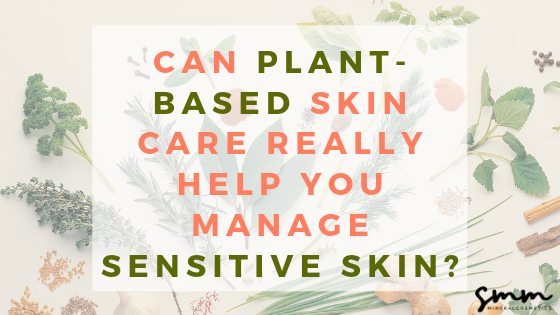Can Plant-Based Skin Care Really Help You Manage Sensitive Skin?
Posted by Barbara Maynard on 31st Jul 2019
As consumers, we’ve become more particular as to the quality of the things that we bring into our lives. Self-care is the new trend, and it’s a great one; we want what’s best for our bodies, our minds, our environment. We look for organic stickers in the supermarket; mindfulness is the new buzzword. Transparency in marketing is a must.
Skin care fits naturally under this self-care umbrella. If we want to take care of our bodies, the skin is an excellent place to start; it is our body’s largest organ, after all, and the face of who we are and what we present to the rest of the world.
Unfortunately, many of the products touted as “skin care” are anything but. They contain irritating additives, harsh chemicals, and preservatives that serve only to extend their shelf life. These unnecessary ingredients can have harmful effects, especially on someone who has skin that is naturally sensitive.
That’s where plant-based ingredients come in.
What is plant-based skin care?
Plant-based skin care refers to the use of skincare products that are made up of all-natural ingredients. These ingredients are derived from plants and berries grown in nature rather than chemicals poured from vials in a lab.
The plants used are selected due to their known healing properties since many are anti-inflammatory and antioxidant rich, which can help soothe and tighten the skin.
Acai berries, for example, are loaded with antioxidants that defend the skin from cell damage. They can be utilized in products like SMM’s Acai Berry Antioxidant De-Puffing Eye Cream to lessen swelling and heal those damaged skin cells without causing irritation and redness in someone with sensitive skin.
But the most impressive thing about plant-based skin care is how it can help manage the peskiest of skin conditions.
How plant-based skin care helps acne-prone skin
Being acne-prone can be a prison sentence for people with sensitive skin. Medications prescribed to treat consistent acne are often harsh and unforgiving.
Benzoyl peroxide is one of the more popularly prescribed treatments, and its side-effects are alarming. Itching, burning, redness, swelling, and peeling are just a few of the “lovely gifts” it can bring to a sensitive face.
The chemical can also have long-term effects, such as a darkening of the skin from post-inflammatory hyperpigmentation.
A plant-based substitute for this bacteria-killing chemical would not come packaged with such brutal side-effects.
Azulene salicylic acid, which is used in our Acne Fighter Azulene Salicylic Acid Spot Treatment Serum, is derived from chamomile and is a gentler solution that uses anti-inflammatory properties to prevent all that redness and swelling while also ridding your skin of dead cells before they can block pores and give rise to that acne in the first place.
Managing rosacea with plant-based skin care
It can be scary to put products on your face when you’re living with this condition since you never know what products will aggravate it or cause a flare-up.
That’s why it’s beneficial to find products with a short list of simple and natural ingredients, so you know exactly what it is you are putting on your skin.
Plant-based products deliver just that.
The best ingredients for this condition should be full of antioxidants to help fight free radicals, like the acai berries, or should be anti-inflammatory, like zinc oxide and green tea extracts. To help balance out redness day to day, we offer a Mint Green Mineral Corrector Concealer that helps camouflage red, broken capillaries and irritation.
Soothing eczema and psoriasis with plant-based skin care
For people living with this chronic condition, dermatologists recommend finding products that are geared specifically toward people with dry and sensitive skin.
Plant-based products are going to be the gentlest and most forgiving for your skin. They shouldn’t trigger skin cell build up, but instead help to slough those dead cells away.
Hemp seed oil can have a major soothing effect for both eczema and psoriasis. The oil is comprised almost entirely of essential fatty acids. These fatty acids build healthy cell membranes and also aid in the production of oils on your skin, which will keep it hydrated.
Southern Magnolia’s Organic Relieve & Heal Eczema Psoriasis Lotion (unscented) is a great option for people who need a little extra relief.
Is plant-based skin care really effective?
Studies have shown that yes, plant-based skin care truly is effective.
This isn’t to say that conventional ingredients aren’t also effective. But plant-based products have been proven to provide the same service while also treating your skin with the delicate, natural touch it deserves.
Conclusion
If your skin is chronically irritated, it’s worth it to look into the skincare products that use the cleanest, most natural ingredients possible.
While there may be other factors contributing to your sensitive skin, like diet or stress, finding plant-based skincare products that work for you can help to manage these flare-ups in the meantime.


